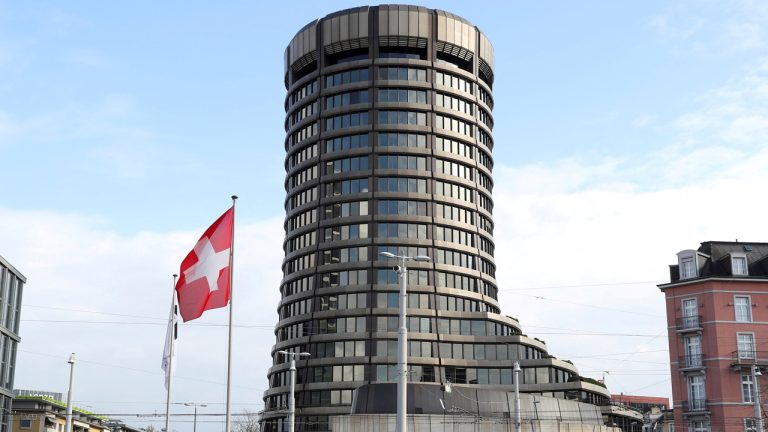
The Bank for International Settlements (BIS) says that rising Bitcoin (BTC) prices spur much greater adoption just a few months later. In a new bulletin from BIS, the institution says retail investors pour into Bitcoin after the price begins to rise, in hopes of chasing high returns. “While the Bitcoin price and user numbers have […]
The post Here’s What’s Driving Bitcoin (BTC) Adoption, According to Bank for International Settlements Research appeared first on The Daily Hodl.
 According to Agustin Carstens, the head of the Bank for International Settlements (BIS), cryptocurrencies have lost the “battle” against fiat currencies issued by the world’s central banks. While speaking at the Monetary Authority of Singapore on Wednesday, Carstens stressed that stablecoins are not reliable because they lack the “institutional arrangements and social conventions behind them.” […]
According to Agustin Carstens, the head of the Bank for International Settlements (BIS), cryptocurrencies have lost the “battle” against fiat currencies issued by the world’s central banks. While speaking at the Monetary Authority of Singapore on Wednesday, Carstens stressed that stablecoins are not reliable because they lack the “institutional arrangements and social conventions behind them.” […]
BIS General Manager Agustín Carstens reckons the war between fiat and crypto has been won by fiat. The community would tend to disagree.
The Bank for International Settlements (BIS) has long taken a cautious approach to Bitcoin (BTC) and cryptocurrencies. No need for caution anymore, however, as the “battle has been won” between fiat and crypto, according to BIS.
BIS general manager Agustín Carstens, who made the claim, highlighted that “technology doesn’t make for trusted money,” among further criticisms of crypto in an interview with Bloomberg.
Crypto has lost the argument that it's an alternative to fiat currency, the head of the Bank for International Settlements says https://t.co/xZKFHEj3b2
— Bloomberg Crypto (@crypto) February 22, 2023
As the central bank for central banks, the BIS has emphasized the need for regulation and risk management in the crypto space–but claiming the fiat battle has been won sparked outrage, satire and corrections among the Bitcoin and crypto community.
Ray Youssef, CEO of Paxful and vocal Bitcoin maximalist told Cointelegraph that it's "easy to get sucked into these battles but is all a distraction with no ROI." He continued, "We must focus on the battles in the global south and fight for every inch and every eyeball. What is happening in Nigeria now is vital for us all."
"Want to p*ss the clowns off? Ignore their FUD bait and focus all in on the global south and what is happening on the streets of nigeria."
Bitcoin author Saifedean Ammous brought the BIS story to his followers’ attention, provoking condemnation and concern in the comments. Florida-based Bitcoin advocate called SVN (not his real name), whose frozen bank account prompted a switch to going all in on Bitcoin, told Cointelegraph that "These people are clowns.”
Meanwhile, Lady Anarki, a Bitcoin advocate based who recently closed a Bitcoin Security Education company explained that “fiat and crypto are essentially the same exact scam.”
“For fiat, it is nefarious elite oligarchs creating a rigged game system to enrich themselves while making everyone else poorer. Bitcoin is a technology designed with incentives and sound economic principles that enriches anyone who brings value to the world.”
Bitcoin losing the "war" for money, as Carstens explained, is another reference to the fact that Bitcoin has been declared dead, dead and dead again. The 2022 and 2023 bear market is no different, and Bitcoin advocates on Twitter seized the opportunity to mock financial experts dancing on the imaginary grave of the decentralized currency.
Nonetheless, Bitcoin is up over 40% from its 2022 lows, and Lightning Network adoption flourishes while the community appears increasingly vocal.
What Bitcoin Did, the popular podcast hosted by football club owner Peter McCormack–number 38 on Cointelegraph’s Top 100–tweeted some handy statistics to correct another inflammatory statement published by the BIS this week. Notably, from August 2015 to December 2022, the BIS explained that “nearly all economies made losses on their Bitcoin holdings.”
BIS analysis: Aug ‘15-Dec ‘22 “majority…in nearly all economies made losses on their #Bitcoin holdings”
— What Bitcoin Did (@WhatBitcoinDid) February 21, 2023
Facts:
-Majority of global fiat lost value to USD since 2015
-USD has lost over 26% of its own value due to inflation#Bitcoin has gone up nearly 8000%
Facts be sticky pic.twitter.com/mMyBzuVhWz
As shown, the Bitcoin price continues to trend higher despite the BIS' best efforts to the contrary.
The BIS has been a vocal critic of cryptocurrencies in the past, citing concerns about their volatility, scalability, and energy consumption. However, the BIS has also researched stablecoins and central bank digital currencies, juxtaposing Carsten's comment in the Bloomberg interview that tech “doesn’t make for trusted money.”
Related: Coinbase staking ‘fundamentally different’ to Kraken’s — chief lawyer
Willem Middelkoop, author and Bitcoin advocate, highlighted that the war between fiat and crypto is far from over. A cursory scroll on the original Bloomberg Crypto tweet would suggest that the war is just heating up.
 According to data from the Bank for International Settlements (BIS), published in the latest BIS Bulletin No. 69, researchers assessed that, on average, most users lost money on their investments over the past seven years. Onchain data, metrics from exchanges, and cryptocurrency application download statistics gathered by BIS researchers suggest that most median retail crypto […]
According to data from the Bank for International Settlements (BIS), published in the latest BIS Bulletin No. 69, researchers assessed that, on average, most users lost money on their investments over the past seven years. Onchain data, metrics from exchanges, and cryptocurrency application download statistics gathered by BIS researchers suggest that most median retail crypto […]
The report suggested that whales with Binance, FTX, and Coinbase “probably cashed out at the expense of smaller holders” by reducing their BTC stockpiles as retail investors bought.
A report from the Bank for International Settlements (BIS) suggested that trading activity on major exchanges increased in the days following the collapse of crypto firms FTX and Terraform Labs.
According to a Feb. 20 bulletin on “crypto shocks and retail losses,” the BIS reported that while the price of Bitcoin (BTC), Ether (ETH), and other tokens dropped in 2022, the number of daily active users at some exchanges including Coinbase and Binance “increased markedly” following news of the collapse of Terra and FTX. The bank suggested that “users tried to weather the storm” by moving their investments into stablecoins and other tokens likely not looking bearish at the time.

In contrast, the BIS reported that whales at the aforementioned exchanges “probably cashed out at the expense of smaller holders” by reducing their BTC stockpiles as retail investors bought crypto. The bank said analysts had looked at the number of downloads of crypto investment apps, noting that roughly 75% of users had downloaded an app when the BTC was more than $20,000 and assuming each user bought $100 in BTC the first month and each subsequent month.
Related: BIS-funded regulator to probe DeFi entry points like stablecoins
“Data on major crypto trading platforms over August 2015–December 2022 show that [...] a majority of crypto app users in nearly all economies made losses on their bitcoin holdings,” said the BIS report. “The median investor would have lost $431 by December 2022, corresponding to almost half of their total $900 in funds invested since downloading the app.” The bank added:
“While the crypto collapse may have affected individual investors, the aggregate impact on the broader system was limited.”
The market crash of 2022 has had industry leaders and regulators speak out on various concerns, from the lack of oversight at a major exchange like FTX to how the crypto market could grow to have the potential to impact traditional financial markets. In the United States, several bankruptcy cases are underway for firms including FTX, Celsius Network and Voyager Digital, while authorities have been moving forward with criminal charges against former FTX CEO Sam Bankman-Fried.

The BIS-affiliated advisory body will release its final recommendations on global crypto asset regulation and supervision in July.
Financial Stability Board (FSB) chair Klaas Knot has outlined how the organization plans to address key threats to financial stability this year in a Feb. 20 letter sent to the G20’s finance ministers and central bank governors. Crypto assets and decentralized finance (DeFi) had a prominent place on the list of challenges the FSB saw. The G20 ministers and bankers group is meeting Feb. 24–25 in Bengaluru, India.
The FSB has an “ambitious work programme” for finalizing a crypto asset regulatory framework in 2023, Knot said. The FSB is an advisory body created by the G20 and affiliated with the Bank of International Settlements (BIS). It has no enforcement powers.
The FSB indicated in a Feb. 16 report that it was increasing its attention to DeFi in light of its potential connections with traditional finance. Now, Knot said the recommendations in the emerging framework may bode ill for some stablecoins:
“Importantly, the FSB’s work concludes that many existing stablecoins would not currently meet these high-level recommendations, nor would they meet the international standards and supplementary, more detailed BIS Committee on Payments and Market Infrastructures-International Organization of Securities Commissions guidance.”
The guidance released by the BIS and International Organization of Securities Commissions in July extends the “same risk, same regulation” principles for financial market infrastructures to stablecoins. Those principles were released in 2012 in response to the 2008 financial crisis.
FSB provides overview on Future Global Standards for Stablecoins Key Takeaways:
— Web3 Daily (@web3_247) February 20, 2023
Stablecoins and other crypto assets are a growing focus for the Financial Stability Board (FSB).
FSB chair stated, numerous stablecoins now in use wouldn’t comply with the global standards es… pic.twitter.com/EG4UM1fyhN
After the FSB publishes its final recommendations for regulatory and supervisory approaches to crypto assets and stablecoins in July, the board will make recommendations for specific standard-setting bodies and monitor their implementation.
Related: Financial Stability Board aims to address crypto-related risks following FTX’s collapse
Knot wrote, “The appropriate regulation of crypto-assets, based on the principle of ‘same activity, same risk, same regulation’ will provide the beginning of a strong basis for harnessing potential benefits associated with this form of financial innovation while containing its risks.”
The letter noted that one of the drivers of crypto asset growth was “dissatisfaction with the existing system of cross-border payments.” It added that the FSB will deliver a report on the next steps in the G20 roadmap on enhancing cross-border payments at the upcoming meeting.

Despite providing many novel services, DeFi does not differ substantially from traditional finance in its functions, the Financial Stability Board stated.
The Financial Stability Board (FSB), the financial regulator funded by the Bank for International Settlements (BIS), is pushing international regulations for decentralized finance (DeFi).
The FSB on Feb. 16 issued a report on the financial stability risks of DeFi, highlighting major vulnerabilities, transmission channels and the evolution of DeFi.
Despite providing many “novel” services, DeFi “does not differ substantially” from traditional finance (TradFi) in its functions, the authority said in the report. By trying to replicate some functions of TradFi, DeFi increases potential vulnerabilities due to the use of novel technologies, the high degree of ecosystem interlinkages and the lack of regulation or compliance, the FSB argued.
Moreover, the actual degree of decentralization in DeFi systems “often deviates substantially” from the stated claims of the founding originators, the authority claimed.
In order to prevent the development of DeFi-associated financial stability risks, the FSB is cooperating with global standard-setting bodies (SSB) to assess DeFi regulations across multiple jurisdictions.

In this regard, a key element to consider would be the entry points of DeFi users, including stablecoins and centralized crypto asset platforms, the FSB said, adding:
“The FSB may consider whether subjecting these crypto-asset types and entities to additional prudential and investor protection requirements, or stepping up the enforcement of existing requirements, could reduce the risks inherent in closer interconnections.”
The FSB emphasized that both asset-backed stablecoins like Tether (USDT) and algorithmic stablecoins like Dai (DAI) play an important role within the DeFi ecosystem through their use in purchasing, settling, trading, lending and borrowing other crypto-assets. The rise of stablecoins would also likely increase the adoption of DeFi solutions by retail and corporate users as well as facilitate the adoption of crypto assets as a means of payment, the regulator suggested.
“With respect to liquidity and maturity mismatch issues, stablecoins are a crucial area of focus,” the FSB wrote, stressing the need to understand the peculiarities of different stablecoins in order to monitor the risk they pose to the crypto industry, including DeFi ecosystems.
Related: Circle squashes rumors of planned SEC enforcement action
The news comes amid the increasing scrutiny of some major stablecoins by global regulators. On Feb. 13, blockchain infrastructure platform Paxos Trust Company announced that it will stop issuing Binance USD (BUSD) stablecoins amid the ongoing probe by New York regulators. The New York Department of Financial Services ordered Paxos Trust to stop BUSD issuance, alleging that BUSD is an unregistered security.

The bank for central banks is expanding its CBDC research while developing a platform to monitor stablecoin balance sheets.
The Bank for International Settlements (BIS) will heighten focus on experimenting with Central Bank Digital Currencies (CBDCs) this year via its research and development arm and will also launch a new project to monitor stablecoins.
On Feb. 7, the Switzerland-based so-called “bank for central banks” announced its Innovation Hub will "increase its focus" on CBDCs in 2023 to improve payment systems.
The bank added its work schedule for the year ahead also includes “Project Pyxtrial,” which it described as a new experiment being launched by the London branch of the BIS Innovation Hub to enable the “systemic monitoring of stablecoins.”
Pyxtrial will develop a platform to monitor the balance sheets of stablecoins. The bank noted that most central banks lack the tools to “systemically monitor stablecoins and avoid asset-liability mismatches,” before adding:
“The project will investigate various technological tools that may help supervisors and regulators to build policy frameworks based on integrated data.”
For its CBDC-related projects, the BIS will focus more on retail CBDCs such as the two-tiered system called Aurum that it piloted in Hong Kong in July 2022.
It stated that CBDCs and payment systems improvements accounted for 15 of the 26 projects that have been active in the last couple of years. It cited increased awareness from central banks as the primary driver.
“This emphasis reflects the interests and priorities of central banks and the G20 countries' programme to improve cross-border payments.”
It also plans to experiment with the distribution of a retail CBDC through an open API ecosystem in a joint experiment with the Bank of England (BOE) dubbed Rosalind.
In 2023, the #BISInnovationHub will increase its focus on improving payments systems and experimenting with #CBDCs; on shaping the future of financial regulation and supervision; and on greening and securing the financial sector. Read more: https://t.co/565s9KK1gn pic.twitter.com/izlF1u0Q22
— Bank for International Settlements (@BIS_org) February 7, 2023
In September 2022, the BIS concluded a pilot for a platform called mBridge, short for Multiple CBDC Bridge. The central banks of Hong Kong, Thailand, China, and the United Arab Emirates took part in the pilot in addition to 20 commercial banks from the countries.
Related: BIS economists suggest improving TradFi with CBDC to attract users away from crypto
According to the Atlantic Council’s CBDC tracker, just 11 countries have fully launched a CBDC which are all located in the Caribbean aside from Nigeria.
There are 17 nations undergoing pilots, mostly in Asia, including China, Russia, Kazakhstan, India, South Korea, Thailand, and Malaysia.
 Economists at the Bank of International Settlements (BIS) have recommended three policies regulators worldwide could adopt in order to deal with the risks posed by cryptocurrencies. “Authorities can now consider a variety of policy approaches and at the same time work to improve the existing monetary system in the public interest,” they advised. BIS Economists […]
Economists at the Bank of International Settlements (BIS) have recommended three policies regulators worldwide could adopt in order to deal with the risks posed by cryptocurrencies. “Authorities can now consider a variety of policy approaches and at the same time work to improve the existing monetary system in the public interest,” they advised. BIS Economists […]
Economists at the Bank for International Settlements (BIS) think central bank digital currencies (CBDCs) could “curb the demand” for crypto. In a new bulletin, BIS economists Matteo Aquilina, Jon Frost and Andreas Schrimpf argue that addressing risks in the crypto market has become a “pressing policy issue” in the wake of high-profile implosions across the […]
The post CBDCs Could Make Traditional Finance ‘More Attractive’ and Reduce Risk From Crypto, Say Central Bank Economists appeared first on The Daily Hodl.